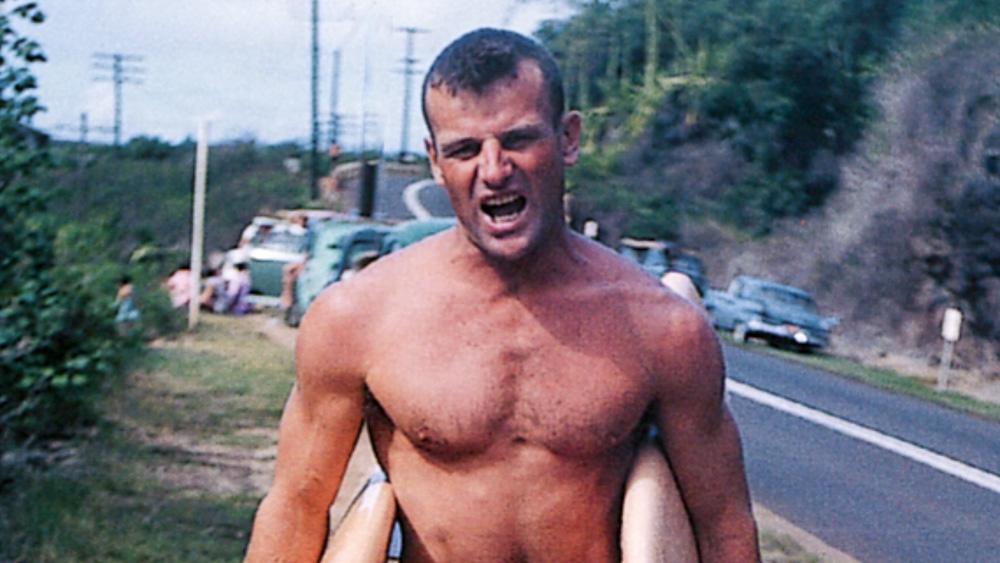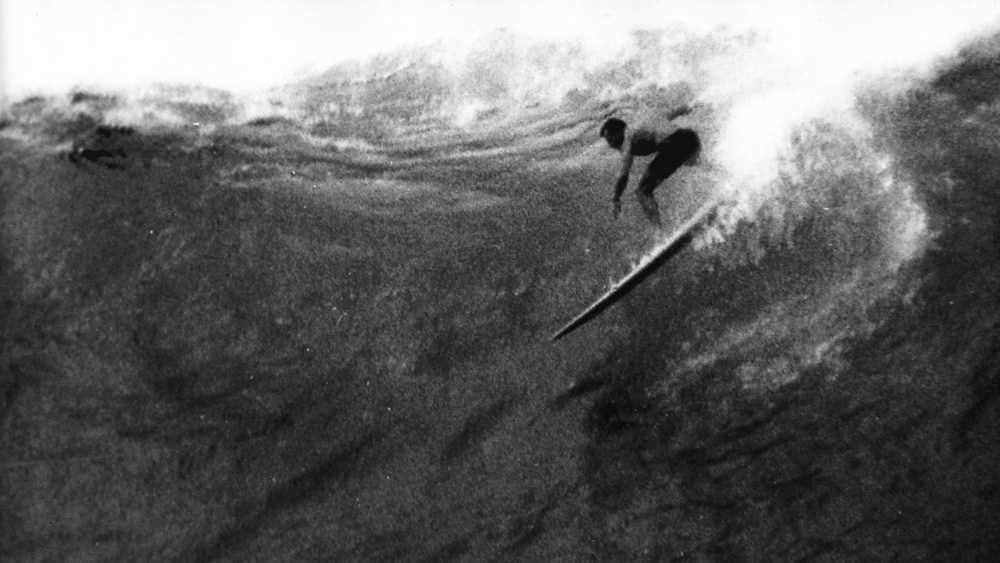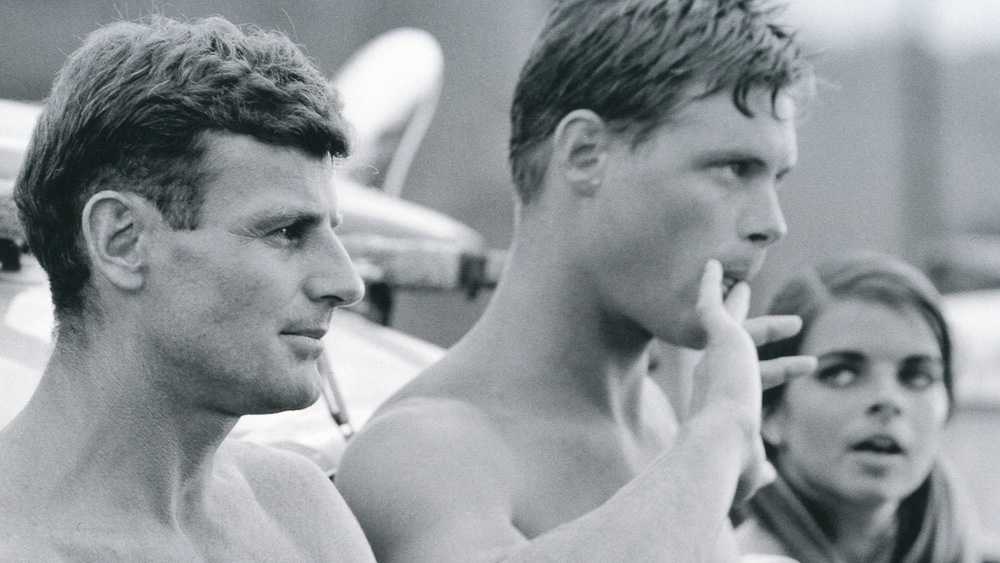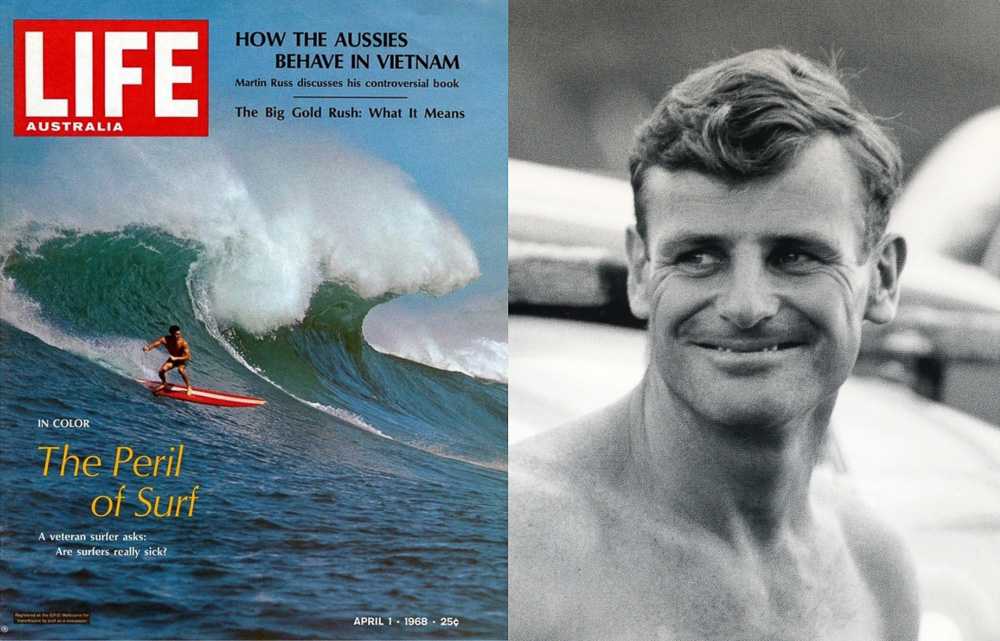"THE SURFER SYNDROME: IT'S USUALLY A CASE OF ARRESTED DEVELOPMENT," FRED VAN DYKE (1968)

Fred Van Dyke's article ran in the April 1, 1968, issue of LIFE Australia magazine. The magazine cover featured an action photo taken at Waimea Bay, with the tagline reading, "The Peril of Surf—A Veteran Surfer Asks: Are Surfers Really Sick?" The version below has been slightly edited.
* * *
Surfing is what's happening. There's nothing else for me. On a red-hot glassy day of surf I don't care who stands in my way. I will surf. Maybe I've got to lie, cut out on my job, anything for the moment when the surf is up. I can't stay away from it. Something snaps inside me. I get diarrhea. My pulse goes out of control. Responsibility, society—it can all get lost. The surf's up and that's where you'll find me.
On the surf scene, evenly staggered waves march around the outside point. I see my friends paddle frantically. Three of them stand up and drop into position. They ride the wave shoreward, and then I paddle out to the group. We sit and talk about close to nothing. One guy engages me in war conversation. I see a wave from my periphery, and nervously inch away from the drone of the voice. The wave builds, leaps high above the horizon. I stroke down into its belly, stand up, and angle for the shoulder.
The whole thing lets loose, top to bottom, and I am covered by tons of white water. Blackness engulfs me. I am 20 feet beneath the surface in a tearing Bendix of ocean. My blood oxygen wanes to a critical point. My ears feel like they will burst from pressure. And then the worst is over.
The wave has passed me by. I grapple to the surface and swim shoreward. I have ridden, been wiped out, and survived another 25-foot Waimea Bay surf. Where does it end? I mean, how many times do I have to prove myself out there? What pushes me? Why does one surf?
You can accept any reasons you want for why we surf. You might praise that untouched beauty of the surf itself. You may say that it makes you feel like something big; it may be the biggest thing you have found to fill your life with meaning. There is nothing like being locked in the face of a wave. You are so far back in the tube that the wave literally surrounds you. It is like running through a tunnel. That's the essence.
And when the wave is gone, and you are waiting for the next one, the sun beats down into your flesh. You feel warm all over. The sea sits like an oiled surface and the water is so clear that you can see the coral bottom as you ride over the reef. Yes, this is beauty—grandeur to me, also. But that's not the whole trip.

What about the cameramen who film the waves, the reporters who write for the surf magazines? And how about the ad men on Madison Avenue, the clothes manufacturers, all the others who have made surfing into a business? I hear young men, who surf seven days a week, five to six hours a day, talk about nothing but surf, surf, surf. I have seen families abandoned for surf. I have seen potential doctors, lawyers, artists completely drop out of society just because they found surfing. And I have seen more than a few, who have already reached professional success, leave their offices and take up the life on the beach, surfing. One newlywed abandoned his wife on a cliff overlooking the surf, while he paddled out to surf until dark. I heard of a fellow in California who was having trouble with his wife because he was spending too much time away from her surfing. She came down on the beach one day and said it's either me or the board. The fellow picked up his board, stuck it in the sand next to his wife and stood back. He scanned them both, then picked up the board and paddled out to sea. That was that.
One famous surfer says that the main reason he surfs is because of the closeness to nature he feels, and the strength and health he derives from the sport. This may be true, but I also suspect that many men ride waves to get away from the pressures of society, their jobs, their families. I think that some surfers really do ride the waves for the pure pleasure of being one with the sea. However, I feel that these surfers who ride for these uncommercial reasons are not in the top group, or at least are not recognized as such. In fact, you may never meet them, because they will be surfing some unknown break half a mile out at sea. I have known some of these Thoreau-like beings. They shape their own boards. They go surfing to find themselves. They paddle out and feel like they are on their own. They know that survival depends on their own conditioning. Some of these men still surf and they are unknown to the camera or the surf magazines. But the surfer who is well known and gives out with the interview about health and love of the sea and all that junk is not looking beneath the surface. Or perhaps he has looked and is afraid of what he saw.
I struggled my way to the brief bits of recognition that I have enjoyed. I kidded myself that there was all this challenge in the sport. I blew a marriage, a job, and all of my material possessions to ride the big waves in Hawaii. I became a slave to the recognition group. I never made a date for anything without considering whether or not the surf might be up. I spent hundreds of dollars on surfing pictures of myself. I searched for years for the perfect board, the one that would catapult me into instant glory. I worked constantly at one thing; I had conceived an insatiable appetite for being recognized as one of the top surfers. And then one night I stood in front of an audience in California.
I was being introduced, to 800 people, as a big wave rider from Hawaii. I looked into the sea of faces, all surfers. I smelled the booze and cigarettes. I saw the lust for prominence in their faces. I thought: Is this what it is all about? Is this why I pushed to the top? And then I looked back.
I looked back to what I had been involved in for those many years. There were my roommates on the North Shore. We lived communally. We didn't associate with anyone unless he was a surfer of some prominence. Some tried to break into our clique. We dismissed them as "kuks." We were like the kids down the street, with the gang and the clubhouse. And despite the fact that we weren't 10 years old anymore, our society accepted the same exclusivity which banned girls from the club. There were girl surfers, all right, some of them champions. That was the point: they were surfers first, girls last.
I can hear my former roommates saying, What do you mean? We chased girls. Yeah, you chased girls, and you even had some dates—when the surf was not up, or when you had not fallen into the sack exhausted from eight hours of surfing.
What I saw now was that the few girls who hung around us, or the ones we picked up in the bars, were simply props. They were a necessary part of the picture that the magazines and movies wanted. The girls made you look more manly. They made people on the outside wish that they could be like you. But you never really got involved with these props. They were something to use, to bolster your ego, to make you look like something that perhaps you were not.

And I looked at the way I lived. My roommates and I were all above 21 when we arrived in the islands. I had wrecked my marriage. The other guys who came and stayed, some for longer than others, never had sustained relationships with girls. In looking at the thing, I feel that we were in a sort of latency period. We were like 10-year-olds, but were over 20 and still in the juvenile gang stage. What we could have been called were latent homosexuals. We were not making it anywhere but in the surfing world. And we were being hero-worshiped. We had forged a society that made props of some and false heroes of others.
I can hear you surfers saying I'm insane. Okay, tell me about your woodie station wagon, with all the surf stickers on the windows. Why do you have to wear the baggies just at a certain height on your hips? Tell me why you came in from surfing when the cameramen left.
Yes, I was not making it in the real world. It went back to my childhood, when I never felt adequate with people. Surfing was beautiful. I did not have to deal with the mundane problems of getting along, and producing. There I was out in the ocean, and all my cares were way back there in the unsafe world, the competitive, cruel, uncaring world.
But why did I tremble so inwardly when I heard that the surf was huge on the North Shore? What about the diarrhea, the shortness of breath as I paddled out for a wave? Wasn't it all worth it when the cameraman caught a fantastic ride of mine? Wouldn't that fame satiate my ego? The first picture didn't, and the next didn't, and the last one made little difference.
My breakthrough came when I faced the fact that I was scared and that all of my friends were too. And all the guys I hero-worshiped, because of their guts to take off in impossible positions on the biggest waves, were more scared than I. The more they were insecure, the more they were driven to ride the bigger waves. The same held for the hotdoggers: the spins, the reverse takeoffs, getting ten toes over the nose, the ridiculous acrobatics that expressed their frenetic attempt to be accepted, were all manifestations of the inner fear we try to avoid facing.
I know that when some of them did face the inner fear, and did something about facing people, facing their manliness, they more or less left surfing behind—or at least put it into the proper perspective.
Still, there are those guys who are fanatically engrossed in surfing, winning contests, getting sponsored by clothing companies, posing for the cameras. What keeps them hung up on this? I can, in part, blame society. I can blame promoters and advertisers. I can blame parents. I can say that the schools are such pressure factories that kids are forced to find something to release their hostility, or their love. I do want to blame our particular culture. How does a young man feel when he is told subtly that it is more advantageous, more acceptable to compete in crushing sports than it is to play and have fun? What happens to a boy who sees only violence on TV, and exploited sex in movies? What happens to his libido when he sees that the sensitive side of himself is admonished? How does he cope with the assumption that boys who are real boys do not cry when hurt, and that if you are going to be successful, you've got to beat the other guy to the punch? What is more beautiful than surfing, where one can retreat from all that, and yet still be recognized as a man?

And so it is that many a surfer, all subconsciously, finds himself in a latent-homosexual stage of arrested development. He lives only with males, and relates only with males. His companionship, except for egocentered dates, is strictly man-integrated. He talks about girls as objects, and treats them as no more than that. He takes girls to the beach, and leaves them to sit there and watch him perform, hour after hour. What is she getting out of the relationship? Is the surfer perhaps looking for a safe mother substitute? Look mommy, look at the ride I just got. Look how much better it was than brother's.
Consider a typical winter on the North Shore. In October, there are some 200 surfers who come from all over the world to surf the big waves at Sunset Beach and Waimea Bay. Most of these surfers come from California, although there are more from Australia each year. These surfers are mostly age 18 to 22. They come with very little pocket money, and are forced to pool their resources, renting one house for as many as 10 or 12. They share cooking, bathroom and money. What is the result? For a lot of them, inevitably, the problems they ran away from follow them.
One guy has a "big brother" complex, so he starts fighting with the biggest guy in the group. Another has an unresolved father problem, so conflicts develop between him and the oldest or bossiest guy in the house. Add to this the artificial environment of no women around, and as soon as girls come to the occasional party, the unit becomes divided and you have the beginning of a real conflict.
One result of all this is that a lot of kids who just came over to surf find out that they don't want anything to do with this scene, and they return to their homes and school before the winter season even begins. Many of those who stick it out are the latent homosexuals, and some of them never grow out of it. I know. I was one of them, once.
[Photos by Don James, John Severson, and Ron Church]